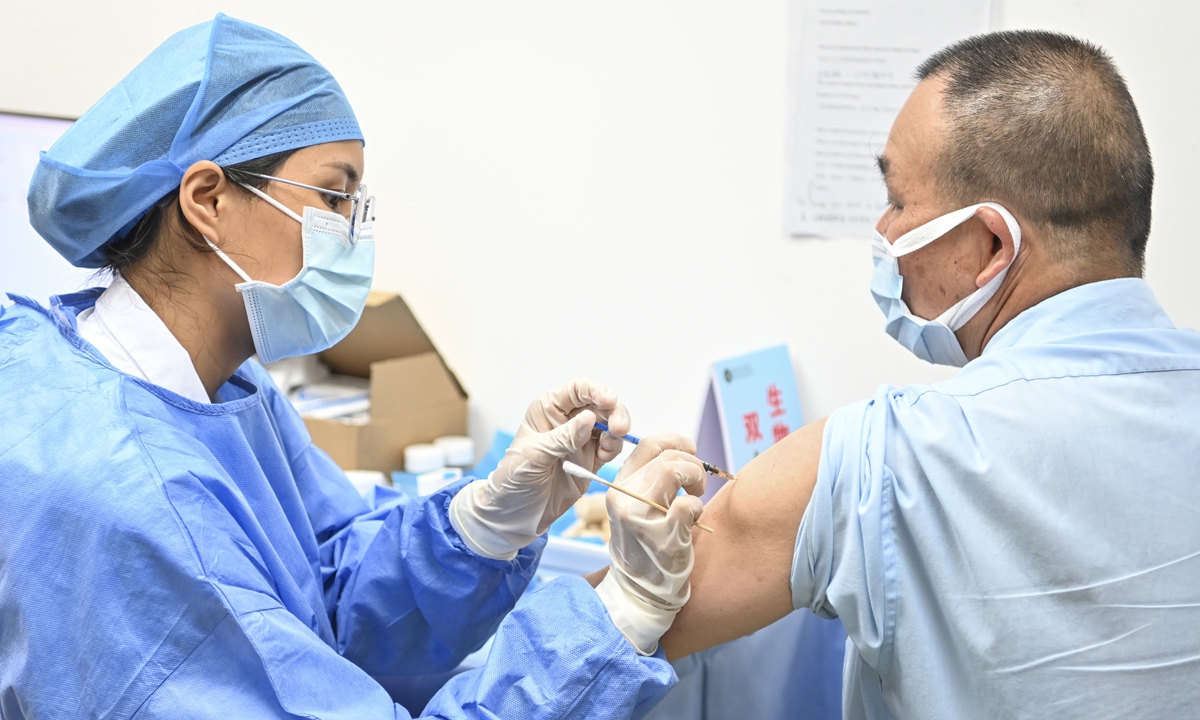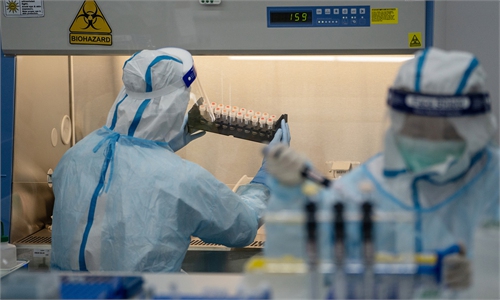S China’s Guangdong reports 16 COVID-19 cases in 6 days, strains related to India, UK

A medical worker inoculates a local resident with COVID-19 vaccine on Monday in Guangzhou, capital of South China's Guangdong Province. Photo: cnsphoto
South China's Guangdong on Thursday reported two new confirmed COVID-19 cases in its capital city Guangzhou and four asymptomatic cases in both Guangzhou and Shenzhen within 24 hours.The virus has spread rapidly in Guangzhou, which is a major difference in the city's current outbreak from the previous ones, said Zhang Zhoubin, a deputy director of Guangzhou Center for Disease Control and Prevention, at a conference on Thursday.
The virus strain of the first case in Guangzhou was found to be from a strain found in India, according to epidemiological investigations.
"The virus is highly transmissible. It can be spread by eating a meal together, or by short and indirect contact," Zhang said.
Guangdong's Party chief Li Xi urged local authorities on Wednesday to curb the spread of the cluster by stepping up efforts to identify the sources of the outbreaks and transmission routes of the resurgence as soon as possible.
COVID-19 resurgence in the province mainly spread along two chains, with virus strains found to be from strains detected in India and the UK, respectively.
Guangdong, Hong Kong and Macao should also optimize and improve joint prevention and control in light of the situation and crack down on rumor-mongering, Li said.
After local reports of the new infections, many vaccination sites in Guangzhou saw long queues of residents waiting to receive a dose. Multiple rumors circulated online claiming that Guangdong was facing COVID-19 vaccine shortages, Guangzhou would stop administering first doses from June 9, and vaccinations would no longer be free after June 9.
Guangzhou's health authority refuted the rumors on Wednesday, saying the city has a stable vaccine supply that can meet local residents' needs. Although the city has set a goal of completing injecting the first doses for target groups before June 9, the administering of first doses would not stop after this date.
From June 10 to 30, the province will be mainly focused on the administering of second doses, and on those who had not received the first injection due to special reasons. The city will continue to give first and second doses to residents to increase the vaccination rate, the authority explained.
Since May 21, the province has reported 16 cases in total, including asymptomatic cases. Among them, seven were found in Guangzhou, nine in Shenzhen and one in Maoming.
The transmission chain that started from Guangzhou has so far spread to the city's Liwan and Haizhu districts and Maoming city. The virus strain of the first case was found to be from a strain found in India.
In Shenzhen, seven cases are related to the city's Yantian Port, an investigation showed. Some patients had also boarded an international cargo ship. The gene sequencing of five confirmed patients shows that the virus strain that emerged in Shenzhen is similar to the mutant strain found in the UK.
Wang Peiyu, a deputy head of Peking University's School of Public Health, said the quick response of local authorities in Guangzhou and Shenzhen to detect the chains and find the relevant personnel within a short period of time has provided a limit for the chain of transmission not to further spread.
He told the Global Times on Thursday that the prevention of the imported virus through cargo ships remains a challenge for many port cities in China given the high volume of trade China has with other countries despite their severe epidemic situations at home.
The inspection and detection of the virus in international cargo is more difficult than the testing of international arrivals as it requires more effort to make sure every corner is safe, he said.
China has seen multiple cases where cluster infections have occurred from international cargo.
In July 2020, four crew members tested positive for COVID-19 in nucleic acid tests on a Panamanian cargo ship docked at a port in Ningbo, East China's Zhejiang Province. In January, a cluster outbreak occurred in Yingkou, Northeast China's Liaoning Province, which started from the infection of four crew members on another Panamanian cargo.

